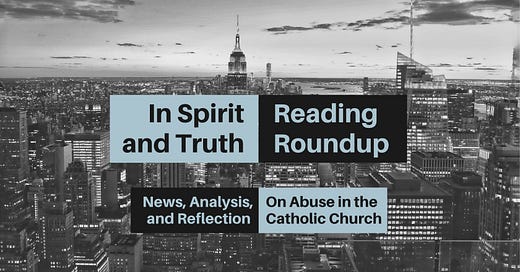In Spirit and Truth Reading Roundup: February Edition
Welcome to the February edition of the In Spirit and Truth Reading Roundup, with news, analysis, and reflections related to the twin crises of sexual abuse and leadership failures in the Catholic Church. (Yes, I know I’m publishing this on March 1st. I blame it on the short month!)
Appreciate this content? Subscribe here to receive next month’s Reading Roundup straight to your inbox.
The Big Stories
Pope Emeritus Benedict XVI published a letter of response to the report criticizing of his actions while archbishop of Munich (read the whole letter here). Many abuse survivors were extremely critical of Benedict’s response. I appreciated this in-depth analysis of Benedict’s mixed record on clergy sexual abuse, as well as this reflection on what a real apology from Catholic leaders might look like.
The ripple effects of the recent French and German reports continue throughout Europe. The commission recently launched in Portugal reported that it received 214 allegations in its first month of work. In Italy, abuse victims are organizing to demand an independent national inquiry. When the bishops’ conference of Spain declined to create an independent commission to investigate abuse, the legislature proposed their own investigation and the public prosecutor’s office reported that they were currently investigating 68 allegations. A few weeks later, the Spanish bishops’ conference relented and announced their own national commission.
Bishop Rick Stika and the Diocese of Knoxville, Tennessee are facing a lawsuit alleging that a parish employee was raped by a diocesan seminarian and that Stika obstructed the investigation. Catholic media outlet The Pillar has done excellent reporting on this situation, including this analysis and summary of the troubling case.
Argentine Bishop Gustavo Zanchetta is currently on trial for sexual abuse of seminarians in his diocese. Zanchetta’s close ties to Pope Francis bring additional attention to this case.
Important International News
Pope Francis announced a restructuring of the Vatican’s doctrinal office, which handles abuse cases. This new structure includes an independent division to manage disciplinary matters, including cases of sexual abuse. Some observers hope that this will allow for greater attention and efficiency in processing these cases.
New Zealand’s Catholic Church released figures indicating that 14% of its diocesan clergy have been accused of abusing children or adults since 1950. This statistic, which includes both sexual and other forms of abuse, was released at the request of the New Zealand commission investigating both faith-based and state care institutions.
A powerful BBC investigation into an Italian priest who was found culpable of sexual abuse in a canonical trial (but not laicized) asks the provocative question “Why is an abuser still working as a priest?” Their report is worth reading.
Catholics in India, including an association of lay and religious women, continue to express outrage at the acquittal of Bishop Franco Mulakkal of Jalandhar, who was widely expected to be convicted of the rape of a nun.
Notable Developments in the United States
Allegations of both historic and recent abuse continue to unfold throughout the United States, including a priest removed from ministry in Queens, New York for sexual misconduct with teens, a Florida priest convicted of raping an adult parishioner, and a former church employee sentenced to 20 years in prison for statutory rape of a teenage parishioner. The bishop of Dodge City, Kansas, John Brungardt, remains under civil and canonical investigation for sexual abuse of a minor.
Bishop Thomas Tobin of Providence, Rhode Island is coming under fire for leaving a priest in ministry after two allegations of abuse were made 2012 and 2014. The diocese recently put this same priest on administrative leave after another allegation of abuse surfaced.
Former Cleveland priest Robert McWilliams was found dead of a presumed suicide in the prison where he recently began a life sentence for child sexual exploitation.
The first criminal charge resulting from the Wisconsin attorney general’s investigation into sexual abuse by faith leaders was filed recently against a (non-Catholic) Christian camp counselor, providing a clear reminder that investigations like this can help victims from any faith tradition. News of this investigation also prompted a former Wisconsin police chief to speak publicly for the first time about his childhood abuse by a Catholic priest. (This report and the included video is an example of excellent local reporting on the issue.)
The United States Senate is considering a bill to remove the statute of limitations on filing civil claims of sexual abuse in federal courts.
Going Deeper
This brief piece by Dr. Adam DeVille outlines three defense mechanisms Catholics must unlearn in confronting reports of sexual abuse and three categories of abuse we should recognize.
The reforms outlined by Pope Francis in Vos Estis Lux Mundi are set to expire in May, including those that establish a system for investigating bishops for abuse or the mishandling of abuse allegations. (About half of Vos Estis investigations worldwide have taken place in the United States, although an investigation was recently launched into the retired bishop of Broome, Australia.) This article offers various perspectives on the successes and failures of Vos Estis so far.
Some interesting work is being done at Notre Dame regarding the possibility of a truth and reconciliation process for responding to the abuse crisis. You can read the report from their latest consultation here.
Thank you for reading and sharing. I’ll see you next week, for our March Survivors’ Voices post!
Peace,
Sara



